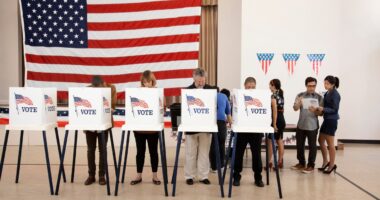Given the toxic divisiveness that has seized the American psyche many argue that these are indeed “the most important elections of our lifetime.” We have been here only once before, in the 1850s, the decade proceeding America’s Civil War. At that time, we were divided into two tribes fighting over one issue: slavery. Today, we may talk about two tribes, but we really are about twenty clans obsessed with narrower issues. These clans do not seem to care much about other issues; but will align themselves with other clans. This practice leads to strange bedfellows. Antiabortionists, trying to save unborn lives, support the gun rights clan whose products kill more children than any other cause. In the process, they are destabilizing the two-party system, i.e., the implosion of the GOP in the House of Representatives, and the pro-Palestinian revolt within the Democratic Party. The traditional American two-party system seems ill-equipped to function in a multi-clan world. I spend more time than most talking to people who disagree with me rather than with those who do agree. (Perhaps because I find it easier to deal with frustration than boredom.) In the 20th century many spoke with passion about a single issue, but they were not prepared to bring down the big tent of their home political party. Occasionally, a passion would coalesce into a third party fighting to get into the White House. They always failed. Unlike the last century, my interlocutors today argue passionately about one, at most two, issues. Other issues seem barely relevant. The tone has turned ugly as well, as it did about slavery 160 years ago. At dinners, arguments tend to slip into “my side is right and yours is evil” before the main course is served. Few people understand or care about the rest of their party’s platform; getting their grievance addressed suffices. For them Trump or Biden are simply the vehicles that will carry them and their passions to power. Biden and Trump differ more in character and personality than in politics. Biden is the professional politician, steeped in the ways of the Senate, his business address for almost 30 years. He calculates every move based on how it will play in the next elections. Unfortunately, in the current multi-clan passionate political environment, his political savvy does not equip him to deal with voters animated by passions rather than facts. Trump is the rabble-rouser who knows how to play a crowd, giving him a great leg up to getting elected in the current environment. He will, and has, promised everything that his audience du jour wants. However, rabble rousing does not translate well into governing, as demonstrated by his shambolic first term and his tenuous relationship to laws and regulations. Their policies are not as far apart as one might gather from the rhetoric. For example, both men have concluded that the American public no longer believes in the liberal economic order established at the end of World War II. Both have reverted to the early 20th century policies of high tariffs and subsidized industries. For the moment, the dynamism and vigor of the American economy, a product of seven decades of free trade, supplemented by the bundles of money thrown at the economy during the economic crisis of 2009 and the socio-economic crisis of the COVID pandemic gave Trump a free ride on a relatively prosperous economy until COIVD arrived. It now gives Biden the time and breathing space to affect what may turn out to be the most drastic revision of the economy since FDR. Biden could lose the elections, however, because he is offering long term program benefits to an electorate focused on the present. Trump could win thanks to his outrageous rhetoric, telling each constituency what it wants to hear and changing his message as the crowd reacts. For example, Trump once told a crowd to get vaccinated and got booed. Now he is silent on the subject other than promising he will put Dr. Fauci in jail for advocating vaccines and masks. But immigration and climate change, for example, are real issues that require real solutions. Unfortunately, they have become political shuttlecocks. For fear of losing the immigration issue, Trump ordered the GOP to kill a border control bill that they had largely drafted. Now, Trump has swung even more wildly to the extreme right to retain the initiative, promising to deport every person here without documents, even those whose cases are still pending in immigration courts. He has doubled down on rhetoric dehumanizing migrants. As to climate change, Trump sees denying it guarantees big bucks from the oil industry. We have a two-party system today because, as any scholar of politics will tell you, single-member constituencies dictate big-tent two-party systems. Third (and fourth or fifth) parties cannot prosper for long in such a system. Do these changes indicate the Europeanization of American politics? Multi-issue divisiveness is incompatible with a two-party system; each clan seeks to dominate the big-tent party. The far right, a smallish minority in the GOP, has taken over
Subscribe
Login
0 Comments



